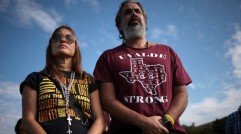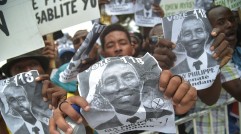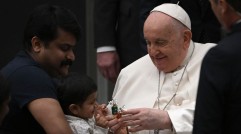Jeanne Córdova, Prolific Lesbian Journalist and Pioneer Activist, Rights the World with Writing and Actions
This article is part of Palabras, the Latin Post Latino Author Series.
Jeanne Córdova, the prolific journalist, pioneer activist, and resounding voice of the national lesbian feminist movement, didn't know she was Chicana until the age of 22, and that discovery expanded her disposition. Throughout the years, the author of "When We Were Outlaws; A Memoir of Love & Revolution" has used her pen to ink, spark and urge conversations about identity, self-discovery, inspiration and living with metastatic cancer.
German-born and the second-oldest of 12 children, Córdova was born to an Irish-American mother and a Mexican father who was a part of a generation that looked to bury Mexican identity. Nonetheless, she inherited more than heritage from her parent, but also inquisitiveness about life and how different components assemble.
"I was born curious about life and how the different parts of life fit together sociologically. I guess I got this from my parents, because the dinner table conversation nightly was, at first, about religion, but later about current events and how and why news happened," said Córdova to Latin Post. "Words were also important to my parents, and my older sister thought they were, too. She and I read a lot in high school, shared a bedroom and argued a lot about words and what they meant."
When Córdova learned that she was Latina/Chicana, she looked at the world through different eyes, and became more Latina as a result. The first wildly different aspect of Córdova's being was being "butch," which divided her bit from the mainstream; yet, she welcomed the opportunity to distance herself even further from middle-of-the-road America, representing Latin roots in that national lesbian movement.
"Being a Latina butch, and also a woman, did hinder me in lots of aspects. When gays went on TV for the first time as openly gay in the early 1970's, I wasn't selected for those roles to represent [the] 'out' community, even though I had a high profile as a lesbian leader, because I was Latina and dark," Córdova said. "But I decided that I'd rather continue my personal identity than de-gender or whiten myself ... or 'pass,' I guess you'd call it, because I had only one self, and I wanted to tell the world that was good enough."
Her personal writing reiterated the validity of her experience, and it often collected themes important to her life, including leadership, decision-making and the qualities of a person or characters. That same writing is grounded in investigation; for instance, she ponders great leaders of the past and the present who inspire her to ask, 'Why?'
Córdova's lengthy career as a journalist, an author, and an actor for social change continues to be hailed, as it can, in part, be credited for the acceleration of women and the LGBT community. Her three books, "Sexism: It's A Nasty Affair" (1974), "Kicking the Habit: A Lesbian Nun Story" (1990) and "When We Were Outlaws: A Memoir of Love & Revolution" (2011), function as a library of social experiences.
"'Sexism: It's A Nasty Affair' was a compilation of my columns for the Los Angeles Free Press, and 'Kicking the Habit' came out of my essay in the award-winning collection 'Lesbian Nuns: Breaking the Silence,'" said Córdova. "'Habit' was written for myself. I had to re-tell the story of why I went into the convent to become a nun and what happened to me while I was there, and why I left. I felt, some 16 years later, that I had to tell myself the story so I could resolve something inside me; to resolve why I made one of the most important decisions of my life -- to leave."
For similar reasons, she wrote "When We Were Outlaws: A Memoir of Love & Revolution." According to the author, writers often write about something in their lives that didn't turn out like it was supposed to. Thus, she writes about the so-called mishaps, surprises or turns that were unexpected, expecting to find explanations for selecting the road that was left untraveled.
"For many decades, when I didn't know what to do next with my life. I asked myself, 'What's the most socially redeeming thing I can do next for the LBGTQ community?'" Córdova questioned. "That question guided my life choices; whether it was to start a certain march, or a magazine or book, or a new wing of the movement."
Currently, Córdova is completing her fourth book, tentatively titled, "Living with Dying." The book will discuss living, what it feels and what it looks like. Also, it will address the awareness of death, particularly when one is dying of metastatic cancer, which is Córdova's reality.
With her partner, South African-born feminist and radio journalist Lynn Harris Ballen, Córdova creates history-themed lesbian feminist exhibits, cultural events and literature. Also, her work was recently featured in the anthologies "American Queer: 100 Years of LGBTQ Activism" and "Untangling the Knot: Queer Voices on Marriage, Relationships & Identity."
Subscribe to Latin Post!
Sign up for our free newsletter for the Latest coverage!










